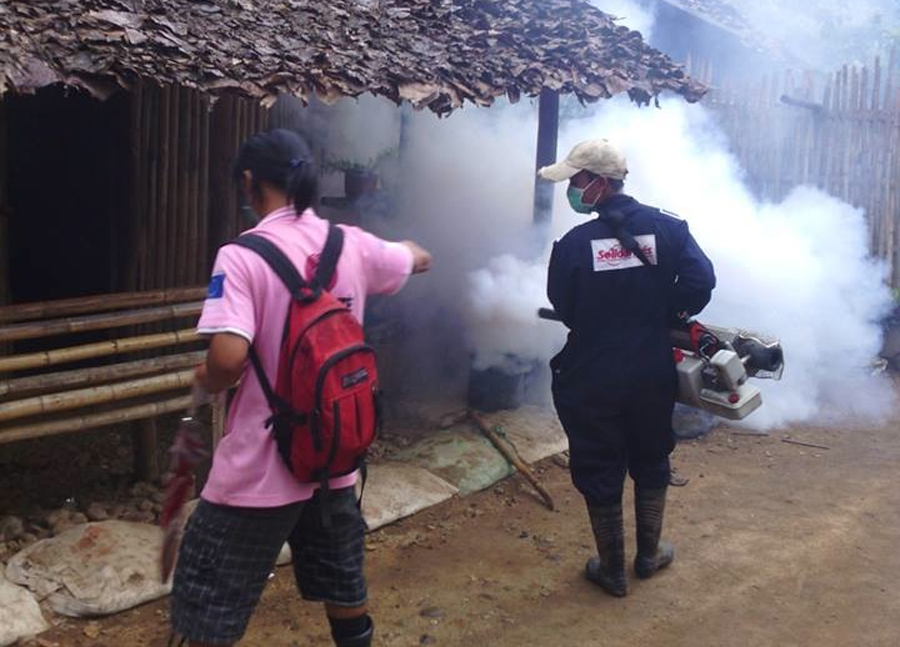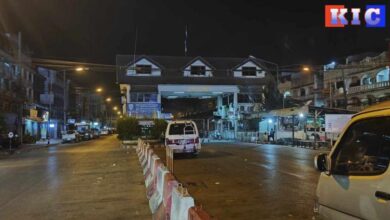Solidarites International: Stopping Dengue, Protecting People

The coming wet season and the threat of a dengue virus outbreak have made Thomas Viger a busy man. As Thailand program coordinator for Solidarites International he is also responsible for organizing the hygiene, water, sanitation and livelihood program at Mae La Refugee Camp on the Thai Burma border.
Mae La is located 60kms north of the Thai border town of Mae Sot, Tak Province and is home too as many as 40,000 refugees from Burma.
Academic health articles regard Mae Sot and Tak Province “as a dengue endemic area in which outbreaks occurs periodically every 2- 3 years.”
In early June this year it was reported that 216 camp residents had contracted dengue fever.
Mr Viger in an interview with Karen News explained the rigorous planning that Solidarites International puts into its dengue prevention program.
“Our planning for this year started in August 2014. In May we started a fumigation campaign that targeted all public places – this lasted five days.”
Mr Viger points out that Solidarites International’s dengue program is not only about fumigation, but also includes education, distribution of information and the delivery of sand-abate (a larvicide that kills mosquito eggs) when necessary and house-to-house visits.
“We visit and check every household and distribute sand-abate every three months. We check water containers and encourage people to clean up garbage and discarded items where mosquitos can breed – old tyres, toys, bottles, cans, broken bamboo poles, old buckets, flower vases and the plates under the vases – anything that can hold small amounts of water.”
Mr Viger maintains that Solidarites International’s intensive mosquito larvae monitoring system is a good indicator and gives early warning of the risk of a dengue outbreak.
“Every month we check 50 households in each of the camp’s sections for larvae, that’s an average of 1,100 households.”
Prior to this month’s outbreak Mr Viger told Karen News that, “this year we are finding in most of the sections that we test that the larvae count is up.”
Solidarites International’s public health team leader, Naw Molly told Karen News that they have started to “warn the camp residents to start destroying the larvae, to clean their water containers and tanks, clear rubbish from around the house and to use sand-abate in their big water containers.”
Mr Viger pointed out to Karen News that in response to a recent dengue outbreak in Mae La, “Solidarites International conducted a full camp fumigation in partnership with Thai District Health Office (DHO) on 9th, 10th, and 11th June 2015. We will conduct a second full camp fumigation on 17th, 18th, 19th June 2015,” Mr Viger, added, “an extra sand-abate campaign has been started too.”
Naw Molly points out to Karen News that dengue is a real health danger to all people in the camp.
“We are trying to prevent people from suffering from a very painful fever. A sick child affects the whole family as it takes a lot of time to care for them.”
Mr Viger stresses that dengue prevention only works well with the assistance of the whole community.
“Our [dengue] project will only work well if we have the support and help of all in the camps – residents, various camp committees, school kids, international non-government and community-based-organisation. We depend on their collaboration and mutual cooperation.”
Mr Viger said it is critically important to plan when dealing with dengue.
“We have in place a Surveillance Rapid Response Team at Mae La Refugee Camp led by the organization Premiere Urgence – Aide Medicale Internationale (PU-AMI) and as soon as we have a confirmed dengue case, within 24 hours we fumigate 100 metres around the patient’s home. We check water containers for larvae and seven days later we follow-up.”
Mr Viger said that this was part of Solidarites International’s standard procedure in response to a dengue case.
“If the patient is a child we do this response around the kid’s school as well. If we get more than three cases in one week we will fumigate the whole section – as many as 600 houses. This year we have already fumigated four sections.”
Mr Viger said that stopping the spread of dengue takes a lot of resources, both human and financial.
“The US government’s Bureau of Population, Refugees and Migrants funds, our project.”
Naw Molly said it is important to support the fumigation program with educational activities and materials.
“We have two dramas that we take to the camp sections – we include dengue and how people can defend themselves against it. We also have educational games to promote awareness and encourage people to take preventative action.”




